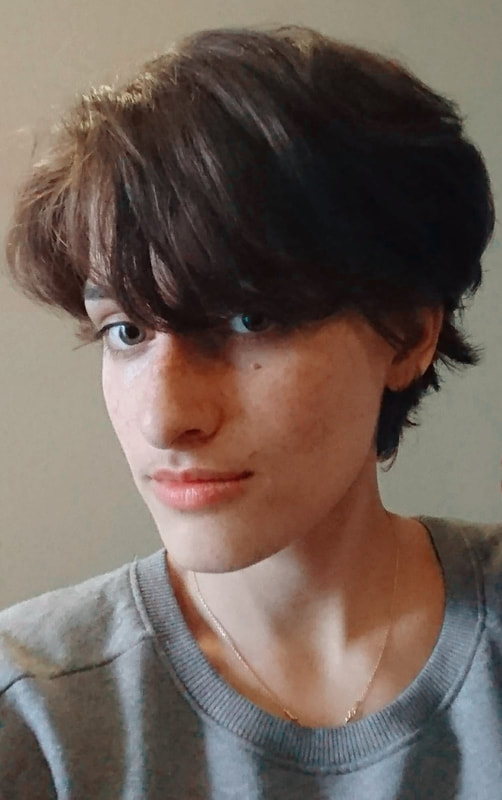The night air sifted through the bedroom window. Hot, humid, and electric with grasshopper song. Every now and then, a car rumbled by and headlights flashed through the blinds, panning across the crumpled bed where Ginny lay. She’d lain there all day, her bones aching with fatigue, staring at the broken ceiling fan and waiting for the time when she was finally allowed to take her pills. That time was now.
Lying on her back, Ginny gulped down the tablets, no water, and shut her eyes. She imagined lying in her mother’s garden, with the sway of the birches above her and the tickle of the tall grasses around her. Swept in birdsong and frothing honeysuckles. The sun pulsed against her bare shins and the birches tinkled in the sky. The air was sweet and pregnant with pollen. So full of oxygen, she could taste it.
A noise sucked her back to the dreary bedroom. Footsteps dripped down the hallway. Little slap-slap-slaps on the linoleum. The bedroom door creaked.
“Mama,” said a small, snotty voice. Beck’s voice. Ginny kept her eyes shut.
“Mama, I can’t sweep.”
“You know,” Ginny said, eyes still shut, “one trick is to be in your bed.”
“I try,” Beck said. “I can’t.”
“Try again, baby.”
Beck didn’t respond. He didn’t leave, either. Ginny willed herself back to her mother’s garden—the humming bees and nodding poppies—but Beck’s presence hung like a black smog over the birches. She sighed and rolled over to face him. His small, backlit frame stood in the doorway, like a paper cut-out of a boy, not a real boy. The dim hallway light caught in the contour of his hair, while his face lay in shadows.
“You’re still here,” Ginny observed.
The paper cut-out boy wiped its nose on its sleeve. It sniffled. Then it said: “Can I sweep with you?”
No, Ginny thought, before knowing why. No, no, no. Reasons came afterward. He’d keep her awake, that much was certain. You weren’t supposed to stay awake on Zolpidem. If you stayed awake on Zolpidem, you might trip—that’s what the doctor said. You might trip, like the druggies and the college kids, and then the doctor would take her off the meds—that’s what he said—because the meds were for insomniacs, not for druggies. Ginny didn’t want to be a druggie, had no interest in drugs. She only wanted to sleep. Which she wouldn’t, if she let Beck stay.
“Hmm,” Ginny said, theatrically. “Remind me, baby, when’s your birthday?”
There was a suspicious pause, then Beck replied: “Septemmer ten.”
“September ten, that’s right.” Ginny nodded. “So soon. And how old are you gonna be on September ten?”
“Six.”
“Gosh, that’s right,” Ginny said. “You’ll be six soon. That’s big. Do you know any other six-year-olds who still sleep in their mama’s bed?”
A reluctant silence stretched between them. “No,” Beck ended it.
“Neither do I, baby.”
Beck seemed to ponder this. In the vacuum of his silence, Ginny felt a weight settle into her head. Numbness bloomed in her chest. Spreading. A blind, heavy nothingness.
Pulsing through her arteries, as slow and hypnotic as the sway of her mother’s birches. Her mattress pulled her deeper into its embrace.
“But—” Beck broke the spell. “I’m still five.”
His voice was a physical pain in Ginny’s head. She aimed her gaze, a little hazy now, at the boy-shaped figure in the doorway. Why was he here? He didn’t belong here. This was her place. Her mother’s garden where Ginny was the child instead of the grown-up and Beck was the kind of name she’d give to a doll one day and change the next. The kind of doll you could hug and love in the day and then forget on the lawn overnight and it wouldn’t matter.
“Behck, go back to your ohwn bed.” Her jaw was slacker somehow, her words a little slurred.
Beck didn’t move.
“Behck—!” she raised her voice.
“I peed my bed.”
Beck’s voice was small. The paper cut-out hung its head.
Ginny’s eyes fell shut. A tide of exhaustion washed over her. He wet his bed. She’d have to get up now and change the sheets. Rinse the mattress. Throw his pajamas in the washer. Force him into the shower while he howled like a wounded animal at the icy water, since she’d missed the water heating bill.
“You did what?” Ginny said, wearily, half-hoping he’d take it back. Who knew, maybe he would. Maybe he’d be too proud to repeat himself. Maybe he’d simply go away—far, far away—and leave her free to wander deep into the ivy-licked shades of her mother’s garden. So deep that no thoughts, or dreams, or guilty conscience could reach her. Please, God, let him go away.
Then, Beck said, in a voice so thin it threatened to break: “I peed the bed, mama.” Something about his voice made Ginny’s eyes flutter open. Headlights passed through the blinds. Her vision was wobbly, but she could still make out his face—not a paper cut-out of a boy, but an actual little boy--her little boy, with his eyes down-turned and brimming with shame.
“Here.” Her arm was an anvil as she hitched up the blanket to make room for him. “Take off youhr wet pahj…” Her tongue stumbled over the word. “Pahja… clothes, and cohme.” Beck wasted no time, perhaps afraid she’d change her mind. Soon, he was under the blanket, wiggling up against her, his skin cool and moist. A whiff of urine trailed him. Ginny plaited her arms around him and squeezed. He was so small and bony. All limbs and hard angles. Like a plastic doll. She giggled. It was almost nice. Like the way she used to fall asleep under her mother’s birches, hugging her dolls.
“What’s funny, mama?”
Many things were funny. Like how the broken ceiling fan had begun to spin, or how the air in the bedroom had begun to breathe. The grasshoppers sang in a foreign language and Ginny recognized bits of words. Cars growled like animals—headlights flashed like sparklers. And beyond it all, somebody was giggling. Was it her?
“Mama, shush,” Beck said, confirming that it wasn’t him. “I can’t sweep.”
Neither could I, kiddo, Ginny thought, but then I met Zolpidem and it changed my life. Here, I’ll introduce you. She saw herself in a beaming white commercial, standing in her mother’s kitchen, the perfect mother figure in a checkered dress and apron, holding out the little blue pill.
A giggle rose in her throat. She bit her lip to stifle it. Her teeth felt like cotton swabs, although she must have bit hard, because her mouth swelled with copper. A giggle bubbled through the blood. Ginny couldn’t help it. It was too funny how obvious it was, how silly she’d been for not realizing it until now: all she had to do was help Beck fall asleep. After all, that’s what good mothers did. Good mothers tucked their children in and wrapped them up in lullabies. Ginny didn’t know any lullabies, but the blue tablets in her nightstand drawer did; they were singing to her right now.
The grasshoppers rang like tinnitus, cheering her on, and the mattress tilted, as Ginny edged toward the nightstand. The air huffed against her, hot and dizzy. Lights flashed in her eyes. “Like cahndy,” she heard her own throaty voice. “Tahstes just like cahndy.” The pill bottle rattled in her hands. Car engines roared. All she tasted was copper. Blue tablets watered through her fingers. Her head throbbed. Snot glistened on Beck’s lips.
Little doll lips. They opened to let in the blue tablet. The grasshoppers reached a crescendo. Beck’s lips shut.
The tablet crunched.
Beck’s breath caught in his nose and he let out half-snort, half-wheeze of disgust.
Ginny burst into giggles. She couldn’t help it. Blood sputtered onto her pillow, like sprouting poppies. The giggles shook through her body. So forceful that her belly cramped, and her eyes watered, and she had to gasp for air. She curled up, hugging her own spasming midriff.
She hadn’t laughed like this since she was a girl in her mother’s garden. High on the scent of blooming honeysuckle, overdosing on oxygen. She was back there now. Back between the swirling pollen and fluttering poppies. Giggling with the birches. Her eyelids were a pair of blooming tulips, swelling into her field of vision. Ginny hugged her doll tighter, her chest bubbling against its knobbly little spine. The tall grasses leaned over her, ticklish. Pollen glistened and coated her skin. Ivy climbed her shins. Honeysuckles braided themselves into her hair, attaching at the roots.
Her doll’s breathing was slow and record-scratchy. Sometimes it stopped altogether. She’d have to ask her mother to fix it. Tomorrow. Right now, it was time to sleep. She was tired. The earth was soft, inviting. The ivy that crept across her was soft as a blanket and the honeysuckles in her hair cushioned her head. The birches were singing to her. It was a lullaby.
CURRENT ISSUE
|
CONTACT
|
DEPARTMENT OF ENGLISH
|



